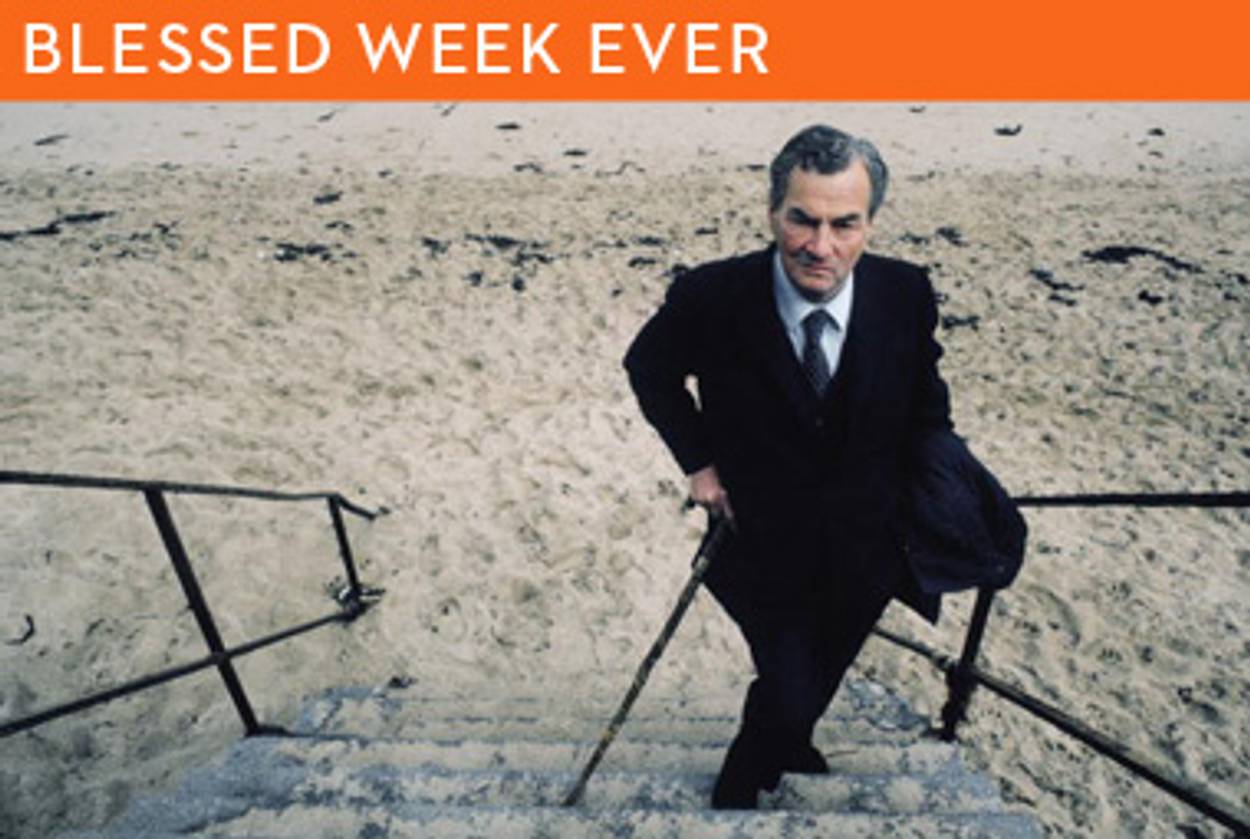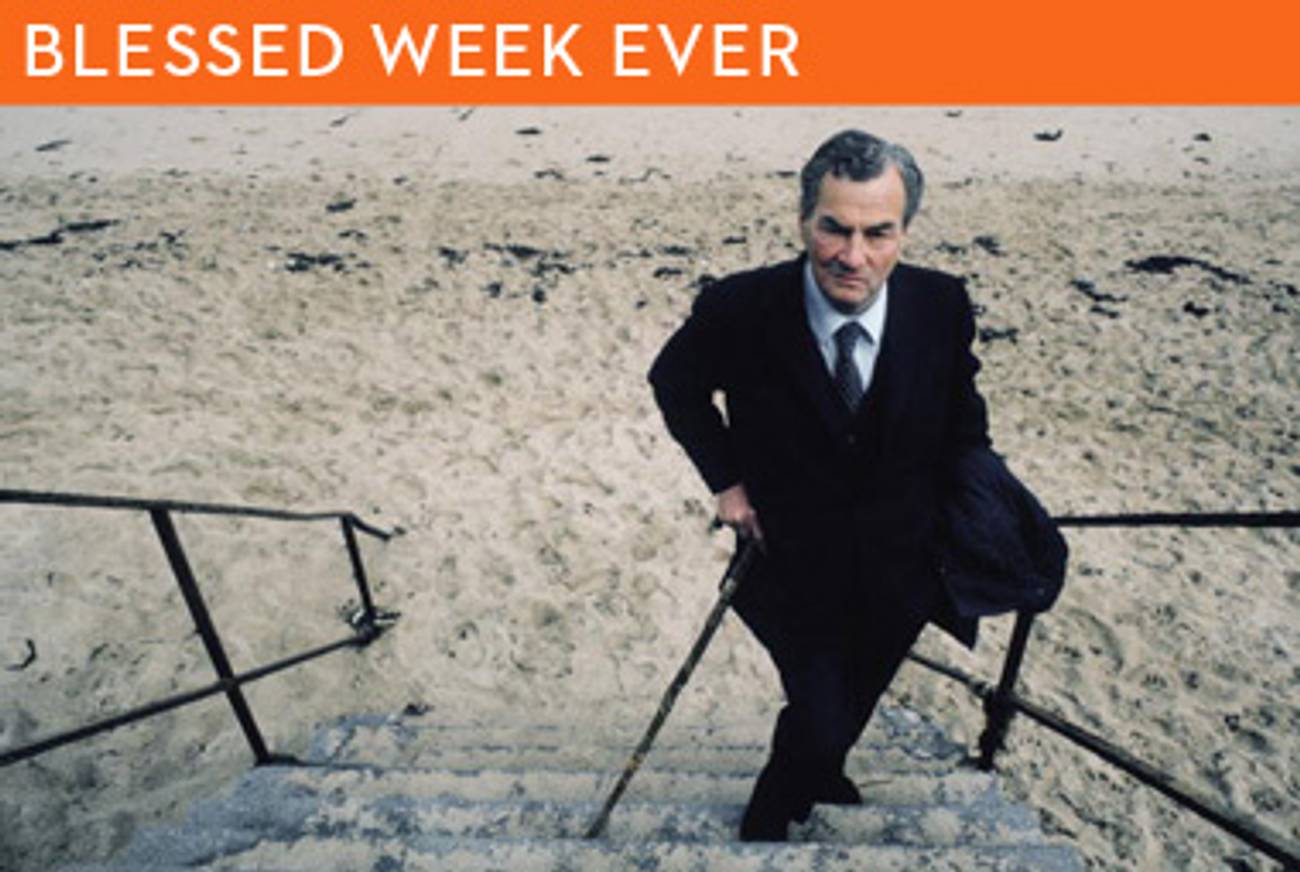Seriously
We are all—from Anthony Weiner to Chelsea Handler to the lazy guy who’d rather watch TV than read a book—afflicted by an epidemic of frivolity. But Moses, who faced it, too, has a cure.




It’s often the smallest moments that make the biggest impact. Mine came years ago, during the course of a chat with a friend, a young and talented aspiring writer. “I don’t necessarily want to write a book,” she said two glasses of wine into a lovely evening. “What I really want is to have written a book.”
Her words never left me. She had attended a very good university for her undergraduate studies and an even better one for her M.F.A. in creative writing. If our mutual chosen profession had a class of knights Templar entrusted with safeguarding its traditions, she was solidly of it. And yet, she seemed to care little about the craft itself. What she craved was the fun, the fame, the fortune. And, more and more over the course of the following years, it was these three specters that haunted her dreams and shaped her career. She never wrote that great novel. She stopped reading great novels; they took too much time. She traded in Crime and Punishment for Law & Order, the searing pain of intellectual pursuits for the numbing comfort of dull amusements, the difficult beauty of truths for the blinding glare of truisms. She tweets now, and writes funny blog posts, and posts a lot on Facebook.
She is plagued by a terrible epidemic, the epidemic of frivolity: I saw the best minds of my generation destroyed by levity, laughing hysterical naked, dragging themselves through tweets and apps at dawn, looking for a funny fix. And she is hardly alone: The congressman who flirts with girls rather than committing himself to his work suffers from it. So, too, does the philosopher who happily exchanged real thought for rakish looks. The plague is all around.
Frequently, when discussed in newspapers, this grim outbreak is blamed on the throngs of aspiring celebrities, reality television stars, and other heat-seeking aspirants. Of course our culture is unserious, goes the argument; just look at how we’ve propelled someone like Snooki—the diminutive and ochre-tinted heroine of MTV’s Jersey Shore—to the pinnacle of popularity. But Snooki isn’t the problem; like so many of her fellow fame mongers, she applied her modest talents to convert what would have otherwise been a withered future into a lucrative career and a small fortune. That requires serious work, and Snooki, God bless her, put it in. Snooki is serious. So many of us, alas, are not.
As I have devoted most of my life to books, my examples, naturally, come from the world of writing. Consider a bit of autobiography that Christopher Hitchens cited in his obituary of the recently departed Patrick Leigh Fermor. The great and popular British travel writer spent his early years being kicked out of various schools before giving up on his educational ambitions and deciding to walk the length of Europe. When World War II broke out, Fermor, no professional soldier, offered his talents to His Majesty’s forces and ended up with a distinguished service that included planning and commanding the heroic kidnapping of the German military governor of Crete, Heinrich Kreipe.
Here’s how Fermor, in his memoir, recalled the aftermath of the operation. “We were all three lying smoking in silence,” he wrote of himself, Kreipe, and another English soldier, “when the general, half to himself, slowly said: Vides et ulta stet nive candidum Soracte. It was the opening of one of the few Horace odes I knew by heart. I went on reciting where he had broken off. … The general’s blue eyes swiveled away from the mountain top to mine and when I’d finished, after a long silence, he said: ‘Ach so, Herr Major!’ It was very strange. ‘Ja, Herr General.’ As though for a moment the war had ceased to exist. We had both drunk at the same fountains long before, and things were different between us for the rest of our time together.”
Can you imagine any of our contemporary writers abandoning a life of pleasure—when the war started, Fermor was holed up in Moldavia with his Romanian mistress, occupied by love and art—to do something as serious and demanding as fight a war? And might you imagine that writer, even if one such specimen could be found who is prone to sacrifice, being able to recall, from memory, one dusky day on the battlefield, Horace’s odes? How many of the men and women whose names are currently on the New York Times best-seller list do you suppose have read Horace? You might think the question is irrelevant; why, after all, should we expect the author, say, of a memoir about one-night stands to be acquainted with Horace’s words to his fellow poet Tibullus about the futility of grieving for a lover who’d abandoned him for a younger man?
The answer, I think, has to do with seriousness. Any author—even an author of light comedic prose—is seeking a great privilege, the attention of his or her fellow citizens. And any author operates on the basis of a terrible presumption, namely that his or her words and ideas are important enough to entomb between two sheets of cloth and preserve for posterity. The least an author could do, then, is to take the task seriously, which might mean, among other things, taking the time to become acquainted with the titans on whose shoulders the entirety of Western culture rests. That, of course, takes time away from tweeting and requires an investment of energy that could otherwise be applied to appearing on basic cable. It is, in short, a losing proposition.
This plague of unseriousness has gotten much worse in recent years, but it is by no means a modern invention. Moses himself knew it well. In this week’s parasha, he is confronted by a gaggle of rebels. Led by the Levite Korach, these wannabes challenge Moses’ leadership and make a compelling case that the aging patriarch should be replaced by a more youthful, ebullient guard. Moses appeals to God. Smiting ensues. By the time the story ends, the rebels are left without cause and without a leg to stand on, the ground having been torn asunder by the Lord, swallowing Korach and his followers.
What sparked this spell of impudence? The parasha never truly says. The speech the dissenters offer Moses is as follows: “Is it not enough,” they ask, “that you have brought us out of a land flowing with milk and honey to kill us in the desert, that you should also exercise authority over us?” They miss Egypt’s earthly delights, they resent Moses his judgment and courage, and, most important, they’re vainly and erroneously convinced they can do a better job. They can’t, and for being so careless and conceited they are put to death.
Of course, in modern times, Korach and his crew would likely have ended up as leaders of some populist Tea Party type of movement, gone on TV, accused Moses of being a socialist, and, perhaps, won office. But let us, if we can, reject the Korachites of our time wherever we find them, especially if we find them inside ourselves. Let us pledge, as much as we can, to be serious. Let us take the time to learn, to listen, to think, to read, to lead. Let us reject easy gratifications and mindless pursuits, however soothing. And let us remember that the right thing is usually very hard to do. Our lives may depend on it. Seriously.
Liel Leibovitz is a senior writer for Tablet Magazine and a host of the Unorthodox podcast.
Liel Leibovitz is editor-at-large for Tablet Magazine and a host of its weekly culture podcast Unorthodox and daily Talmud podcast Take One. He is the editor of Zionism: The Tablet Guide.